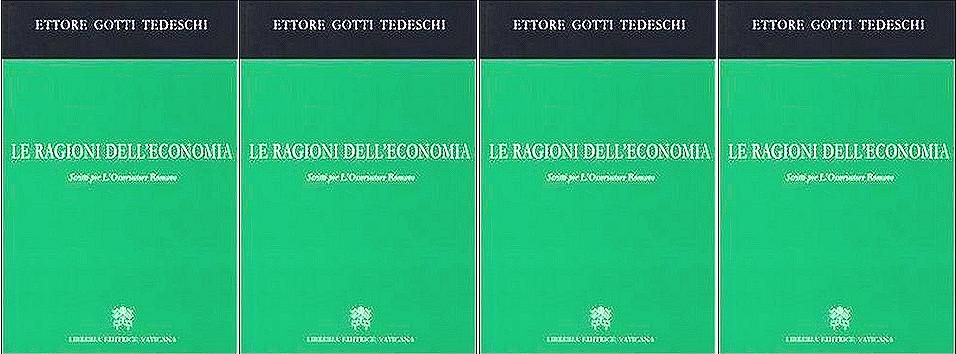
 Le ragioni dell'economia. Scritti per L'Osservatore Romano
Le ragioni dell'economia. Scritti per L'Osservatore Romano
(The reasons of the economy: Writings for L'Osservatore Romano)
by ETTORE GOTTI TEDESCHI
Vatican City, Libreria Editrice Vaticano, 2012, 167pp, euro 14
Benedict XVI and the global economy:
Man must change, not his instruments
by ETTORE GOTTI TEDESCHI
Translated from the 2/22/12 issue of
 On Wednesday, February 22, a book by Ettore Gotti Tedeschi, president of the Vatican IOR, was presented at the Libreria internazionale Paolo VI, the LEV bookstore located at the ground floor of the Propaganda Fide headquarters off Piazza di Spagna. Herewith is the author's introduction to the book.
On Wednesday, February 22, a book by Ettore Gotti Tedeschi, president of the Vatican IOR, was presented at the Libreria internazionale Paolo VI, the LEV bookstore located at the ground floor of the Propaganda Fide headquarters off Piazza di Spagna. Herewith is the author's introduction to the book.
What does it mean to write for
L'Osservatore Romano, the Pope's newspaper? I asked myself this when in the autumn of 2007, its new editor, Giovanni Maria Vian, asked me to do that.
The answer I gave myself was as follows: to contribute through my own competencies and knowledge,e in disseminating the messages that the Pontiff wishes to convey by to seeking to support his teachings with analyses and considerations on economic facts.
Writing for the
Osservatore has also meant a new exercise for me in attempting to interpret economic facts with a reading that is consistent with Catholic social doctrine, especially the contents of the encyclicals
Deus caritas est and, above all,
Caritas in veritate.
My immediate temptation was to resort to moral arguments, but the editor discouraged that idea right away, asking me to be more technical in my interpretations and give minimum space to other considerations.
That is the reason for my 'technical' editorials, which are conceived and written according to the Catholic viewpoint, in the belief that natural laws are the essential premise for economic laws, and that the latter do not function if they do without the first. The reader can draw moral considerations from the analysis of facts.
My contributions to
L'Osservatore, often picked up by other media, has been facilitated by the orientation that I have derived from
Caritas in veritate, an encyclical on globalization written by a Pope who knows how to talk to the global audience. It is an encyclical which is, in fact, a manual for understanding and confronting the great economic problems that torment our time.
In this sense, my work was facilitated. Above all because I always had clearly in mind what Benedict XVI wrote in the introduction to the encyclical.
What are the cultural and moral conditionings that weigh upon the men of our century who are confused by the dominant nihilism that does not allow them to have any absolute references, nor to find a meaning in life, and therefore, of their own actions? And how can a man in such circumstances distinguish between means and ends, nor even to properly use the sophisticated instruments he now has at his disposition unless he can give them the necessary meaning?
In his introduction to CIV, the Pope implicitly poses a question: Which comes first - freedom or truth? Earthly life and its successes, as well as eternal life itself, depend on the answer.
Benedict XVI explains that it is not so much the instruments that should be changed but man himself. And this struck me with such force as to constrain me to change my viewpoint as an economist.
To change man himself. Every Catholic ought to have this responsibility. If we fail to understand this, we shall not succeed to prevent economic instruments from assuming a moral autonomy, escaping from man's control.
That is why I have insisted so much that the origin of the current economic crisis goes back to the decline in birthrate, according to the prospects expressed in the first chapter of the encyclical, in reference to Paul VI's
Humanae vitae.
For this reason, I have often looked at the development of the economic crisis and of the errors that have been committed, drawing inspiration from that chapter, in which Benedict XVI refers to another encyclical by Paul VI,
Populorum progressio.
And so, in the succeeding chapters, Benedict XVI explains how man can change, and the consequences that would accrue if he succeeded, or alternatively, if he fails.
Often, the outside world refuses to acknowledge the rationality of the Catholic faith, but they must agree that when things are going wrong as they do today, one must attribute the responsibility to man and his misuse of the instruments given to him, not to the instruments themselves which are neutral per se.
And so, to think of changing the world by changing the instruments rather than man himself is a tragic illusion.
In my editorials which are collected here, I have always referred to CIV as an indispensable manual against going wrong. In fact, my articles can be considered a summary synthesis of what the Pope has explained magisterially in the encyclical.
For this reason, I dare to offer this book to Benedict XVI, a book that his publishing house has seen fit to publish.
[Modificato da TERESA BENEDETTA 23/02/2012 17:53]